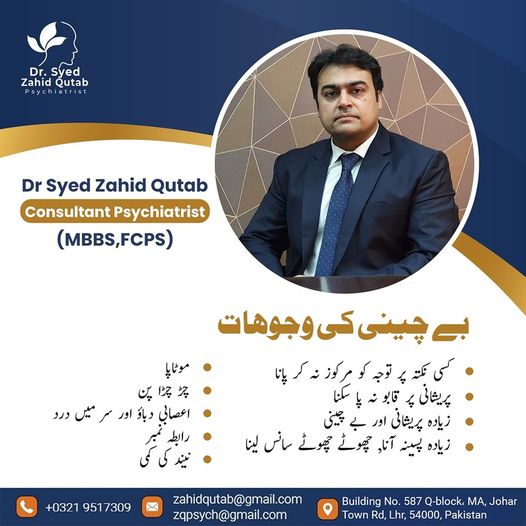Looking for professional mental health services in Lahore? Look no further than Dr. Syed Zahid Qutab, a highly trained and experienced best psychiatrist in Lahore who has helped countless individuals overcome a wide range of mental health issues.
Dr. Qutab is equipped to provide comprehensive treatment and rehabilitation for anxiety, panic attacks, drug addiction, schizophrenia, depression, obsessive-compulsive disorder, bipolar disorder, sexual dysfunction, sleep disorder, memory issues, childhood mental health problems, and many other mental health conditions.
With extensive experience working in reputable hospitals and health facilities throughout Lahore, including Jinnah Hospital Lahore, Fatima Memorial Hospital Lahore, and Gulab Devi Teaching Hospital Lahore, Dr. Qutab has honed his skills and expertise in the field of psychiatry. He graduated from Allama Iqbal Medical College, Lahore, and completed his post-graduation in psychiatry at Jinnah Hospital Lahore.
Dr. Qutab is committed to providing the highest quality of care to all of his patients. Don’t wait to seek the help you need for your mental health – schedule an appointment with Dr. Syed Zahid Qutab today.

Our services address various mental health issues and disorders.
Obsessive Compulsive Disorder
وہم اور وسواس کا مرض
Bipolar Affective Disorder/ Mania
مزاج میں غیر معمولی اتار چڑھاو
DEPRESSION
اداسی و مایوسی کا مرض
اینگزائٹی(گھبراہٹ) سے متعلقہ ڈس آرڈرز
Post Traumatic Stress Diaorder
پوسٹ ٹرامیٹک اسٹریس ڈس آرڈر
PERSONALITY PROBLEMS
شخصیت کے مسائل
SCHIZOPHRENIA
شیزوفرینیا






No matter your unique needs, we’ll help you get to a new point in life faster than ever!
Under the supervision there is a psychiatric department in MSK Dialysis Medical Complex which is providing best psychiatric treatment facility by Dr. Syed Zahid Qutab in Lahore. Our services include evaluating and diagnosing psychiatric disorders, treating psychiatric disorders, and preventing mental health problems.
MSK Dialysis Medical Complex، 387-E Khayaban-e-Firdousi, Block E Phase 1 Johar Town, Lahore, Punjab 54782
GONDAL MEDICAL COMPLEX, HOSPITAL ROAD, CIVIL LINES, GUJRANWALA.
For Appointment: Call Us
CENTRAL HOSPITAL, GUJRANWALA
For Appointment: Call Us
Call or WhatsApp on the below numbers for an appointment.

Dr Syed Zahid Qutab is an experienced and best psychiatrist who has dedicated his life to helping people suffering from mental health issues.
Best psychiatrist in Lahore,
387-E Khayaban-e-Firdousi, near Allahu chowk, Block E Phase 1 Johar Town, Lahore, Punjab 54782, Pakistan
Days and Timings:
Monday 03:00pm to 10:00pm
Wednesday 03:00pm to 10:00pm
Thursday 03:00pm to 10:00pm
Friday 03:00pm to 10:00pm
Sunday 03:00pm to 10:00pm
For appointment: 0321 1439754
Days and Timings:
Saturday 1:00pm to 09:30pm
For appointment: 0311-1222643
055-4277072
055-4277073
055-4277074
For appointment: +92 321 1439754